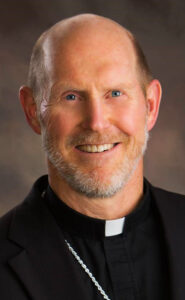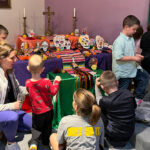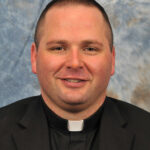“Merciful and gracious is the LORD, slow to anger, abounding in mercy” (Psalm 103:8).
Dear friends in Christ,

In what spirit are we beginning our Lenten journey? What is our focus? Who is our focus? What questions are on our minds? Is it: What am I going to give up; how am I going to fast? Is it: To whom shall I give alms? Is it: How will I pray more? Or perhaps: What sins in my life do I need to pay attention to? How am I tempted? Where have I grown thirsty, blind, or even dead?
These aren’t bad questions. They can be quite helpful, important, even necessary. But, if we’re not careful, focusing only on the I — on the me — risks making Lent all about us. About what we are doing. And that’s a deadly spiritual trap. Rather, Lent is really about what Christ has done, is doing, and will do. Because, without Christ, we can do nothing.
Yes, we’re tempted. But if we stop there, if that’s where our attention lies, we give evil too much power. Christ is the one who helps us meet temptation head on, and overcome it.
Yes, there are parts of our lives that are parched and dry. We thirst for love, for meaning, for faith. But if we dwell on our thirst alone, we miss the One who brings us to life-giving water, who refreshes and renews us.
Yes, there are aspects of darkness that we have embraced, and truths we would rather not see. If that’s our focus, however, we miss the light that shines even into the most shadowed corners of our lives.
Yes, we know death in its many forms, the places where it has taken hold in our lives. We can wallow there, or we can look to the One who is the Resurrection and the Life.
As we’re told in the Gospel for Ash Wednesday, our fasting, prayer and almsgiving are not meant to put the spotlight on us, but rather to help shift our gaze to Christ, the One who accompanies us into the desert, the One who journeys with us to and through the Cross. Our Lenten observance, and the Christian life as a whole, are therefore more about gratitude than guilt.
Lent is not about us, but about the love of God made flesh, who offered himself at the Supper and at Calvary for our sakes, and whom death could not hold bound. Lent is about Christ, who, because of that self-gift — a gift we remember and celebrate every time we gather for Eucharist — overcomes, forgives, and heals our sins today. And Lent, as we hear on the Second Sunday of Lent, is about promised glory.
Lent invites us into the journey that leads to font and table. It is the journey that calls us to embrace the life-long task of conversion, of turning away from sin and embracing the Gospel. It is the journey that leads to the fullness of God’s promised reign, where death and tears are no more. And that, dear friends, is Good News, Good News worth sharing!
Sincerely in Christ,
Most Rev. Thomas R. Zinkula
Bishop of Davenport
Embarcate en una jornada
espiritual este tiempo de Cuaresma
“El Señor es ternura y compasión, lento a la cólera y lleno de amor” (Salmo 103, 8)
Queridos amigos en Cristo,
¿Con qué espíritu comenzamos nuestro camino de Cuaresma? ¿Cuál es nuestro centro de atención? ¿Quién es nuestro centro de atención? ¿Qué preguntas tenemos en nuestras mentes? ¿Es a qué voy a renunciar? ¿Cómo voy a ayunar? ¿Es a quién daré limosna? ¿Es cómo oraré más? O tal vez: ¿a qué pecados en mi vida debo prestar atención? ¿Cómo soy tentado? ¿Dónde me he vuelto sediento, ciego o incluso muerto?
Estas son algunas preguntas que pueden ser muy útiles, importantes e incluso necesarios. Pero, si no tenemos cuidado, centrarnos solo en el yo – o en el mí-, corre el riesgo de que la Cuaresma se centre solo en nosotros. Sobre lo que nosotros estamos haciendo. Y esa es una trampa espiritual mortal. Más bien, la Cuaresma se trata realmente de lo que Cristo ha hecho, está haciendo y hará. Porque, sin Cristo, no podemos hacer nada.
Sí, estamos tentados. Pero si nos detenemos ahí, si ahí es donde está nuestra atención, le damos demasiado poder al mal. Cristo es quien nos ayuda a enfrentar la tentación y a vencerla.
Sí, hay partes de nuestras vidas que están resecas y secas. Tenemos sed de amor, de sentido, de fe. Pero si nos detenemos solo en nuestra sed, perdemos a Aquel que nos lleva al agua que da vida, que nos refresca y nos renueva.
Sí, hay aspectos de la oscuridad que hemos abrazado y verdades que preferiríamos no ver. Sin embargo, si ese es nuestro enfoque, perdemos la luz que brilla incluso en los rincones más oscuros de nuestras vidas.
Sí, conocemos la muerte en sus múltiples formas, los lugares donde se ha apoderado de nuestras vidas. Podemos revolcarnos allí, o podemos mirar a Aquel que es la Resurrección y la Vida.
Como se nos dice en el Evangelio del Miércoles de Ceniza, nuestro ayuno, oración y limosna no están destinados a ponernos en el centro de atención, sino a ayudarnos a cambiar nuestra mirada a Cristo, Aquel que nos acompaña en el desierto, Aquel que camina con nosotros hacia y a través de la Cruz. Nuestra observancia de la Cuaresma y la vida cristiana en su conjunto, por lo tanto, tienen más que ver con la gratitud que con la culpa.
La Cuaresma no se trata de nosotros, sino del amor de Dios hecho carne, que se ofreció a sí mismo en la Cena y en el Calvario por nosotros, y a quien la muerte no pudo atar. La Cuaresma se trata de Cristo, quien, debido a ese don de sí mismo- un don que recordamos y celebramos cada vez que nos reunimos para la Eucaristía-, vence, perdona y sana nuestros pecados hoy. Y la Cuaresma, como escucharemos en el Segundo Domingo Cuaresma, se trata de la gloria prometida.
La Cuaresma nos invita al camino que lleva a la Fuente y a la Mesa. Es el camino que nos llama a abrazar la tarea de toda la vida de la conversión, para alejarnos del pecado y abrazar el Evangelio. Es el camino que lleva a la plenitud del Reino prometido de Dios, donde ya no hay muerte ni lágrimas. Y eso, queridos amigos, es una Buena Noticia, ¡Una Buena Noticia que vale la pena compartir!
Sinceramente en Cristo,
Rev. Mons. Thomas R. Zinkula
Obispo de Davenport











